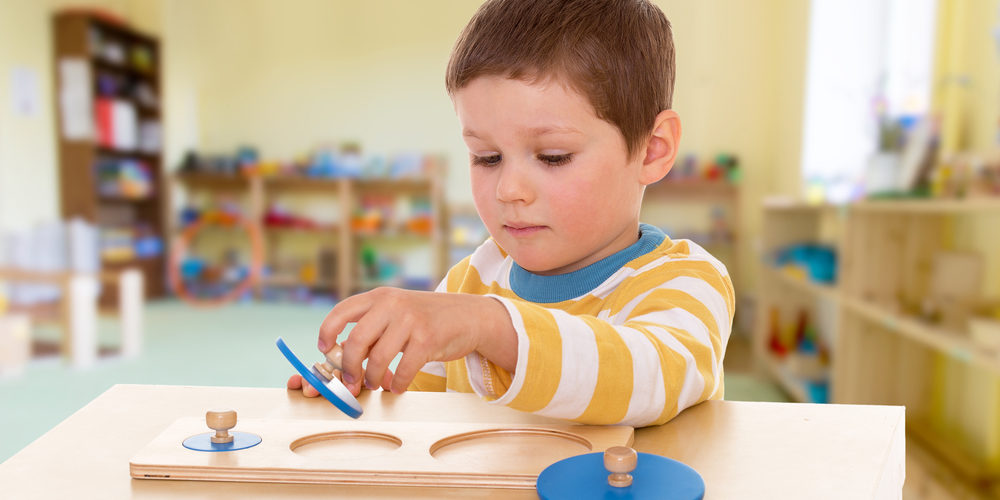The kind of education your child receives will impact how they see the world around them. That’s why you want to choose the best program and school for them; you want them to be successful. So you may wonder, “Why should I choose Montessori for my child?” How will it benefit them?
Turns out, there are plenty of reasons to choose Montessori for your child. If you want to raise someone who is strong, confident, and knowledgeable about the world, you will love Montessori—and your child will, too. Let’s have a look at why:
1. Montessori Meets Kids At Their Level
One of the reasons many parents are deciding to enroll their children into a Montessori program is for the special attention and care each kid receives. Most traditional schools continue to see the student as a body, not as an individual. Teachers conduct a class without truly engaging their students, and that diminishes the purpose of an education.
Montessori schools are different. Teachers see each student and analyze where they are and what they need. From there, each student has a unique lesson plan. No one is rushed. No one is pushed through to the next grade. Every student is allowed to be just as they are, so they can work at their own speed.
The children are given the freedom to choose how they want to learn for the day. Will they practice a skill from yesterday? Or will they try something new? No matter what, children return home each day with a feeling of accomplishment.
2. Montessori Works on Concrete Then Abstract Concepts
If you want to teach critical thinking, you need to engage the mind. In Montessori education, the environment and lessons are based on concrete facts. There is no fantasy in the Montessori classroom. Children work on mathematics, science, geography, and literacy from an early age. They use their senses to teach them about the world.
For example, a child might learn how landforms from an underwater volcanic explosion through a smaller-scale science project. They also look at visual representations of numbers to understand the size of one thousand versus a hundred.
View this post on Instagram
3. Montessori Fosters a Love of Learning
Dr. Maria Montessori believed that children learned best when they get to decide what they’re learning. Back then, this was a revolutionary thought. But time and again, Montessori’s philosophy has inspired children and helped them find a lifelong love of learning.
But why do kids in a Montessori classroom love to learn? It’s based on something called “intrinsic motivation.” This is otherwise known as motivation from within. Unlike external motivation, which is driven by, for example, the promise of a reward for taking out the trash, Montessori students learn to let their curiosity take the wheel.
What they want to learn, they pursue. Because of that, they stay interested and are able to concentrate longer.
4. Montessori Teaches Self-Reflection and Self-Assessment
Self-correction is integral to Montessori education. Although teachers in the Montessori classroom develop individualized learning plans based on every student’s abilities and interests, the tasks that the children occupy themselves with are based on self-assessment.
A child naturally begins to understand why they first spilled the juice when they poured too fast and modify their methods to do it right. Kids who don’t understand how something works look to the role models in the room then practice on their own time to master the skill. As students get older, they begin to think more critically and will recognize their mistakes before they happen.
5. Book Smarts Aren’t Everything in a Montessori Education
Overall, Montessori education isn’t based solely on what a child is mentally capable of. There are no standardized tests or difficult assessments. Instead of focusing on building only the academic brain, Montessori sees the value in nurturing a child’s interests and helping them grow into well-rounded human beings.
Physical, emotional, social, and cognitive skills are built in the prepared environment of a Montessori classroom. Children in a Montessori school learn the importance of dressing themselves, cleaning, communicating and expressing their emotions, setting boundaries, and problem-solving in difficult situations throughout their time in a Montessori school.
Plus, in a multi-age classroom, the kids can teach each other. This gives older students a chance to become accountable leaders while teaching younger students the art of grace, courtesy, and cooperation.
Happy Kids Go To Montessori Schools
Why choose Montessori for my child, you ask? Each Montessori classroom is a small community of passionate, hard-working, free-thinkers. Even at a young age, children are curious and want to explore the world around them. A Montessori education gives them the freedom to learn the way they want, and that helps them gain valuable life skills that traditional schools don’t teach.
Are you looking for a Montessori school in Philadelphia? We welcome you to Fishtown Montessori, a certified Montessori school with programs for young movers and shakers. Get in touch with us today to set up your tour and see if our school is right for your little one.






